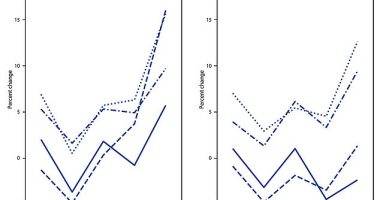A simple sticker could pave the way for easier diagnoses of diabetes, heart disease and kidney failure.
Washington researchers developed a small adhesive health monitor that people can wear discretely on their arms filled with tiny pathways that collect and measure their sweat and levels of three key health markers.
Human testing of the sticker-like devices have shown they are highly accurate in providing measurements of glucose, lactate and uric acid, which could hint at potential kidney and heart issues, as well as diabetes.
Sweat can reveal a myriad of health conditions, but unlike blood sampling, collecting it is non-invasive. And the flexible health monitors were made in a 3D printer for a quick, inexpensive manufacturing process.
Researchers said the devices have the potential to make a huge impact on the healthcare field as they provide a new method to catch diseases early.


Sweat contains many important metabolites that can reveal health conditions, and unlike blood sampling, collecting sweat is non-invasive


The health monitor measures sweat on a volunteer’s arm. As part of the prototype testing, shown above, the sweat was dyed red and the blue patch was used for laboratory comparison
Chuchu Chen, a Washington State University PhD student and first author of the paper, said: ‘Diabetes is a major problem worldwide.
‘I think 3D printing can make a difference to the healthcare fields, and I wanted to see if we can combine 3D printing with disease detection methods to create a device like this.’
In testing, people wore the patch while exercising and it changed color to indicate the specific biochemical levels of the three markers.
It measured users’ levels of uric acid, used to diagnose kidney problems, glucose levels, used in diabetes diagnoses and lactate levels, which reflect exercise intensity and indicate when a person reaches their maximum threshold, a key indicator of personal fitness.
When the researchers compared the results from the monitors on volunteers’ arms to traditional lab results, they found the monitors accurately and reliably measured the concentration of the chemicals and the sweat rate.
Researchers wrote in their report, published in the journal ACS Sensors, the study successfully demonstrated ‘the functionality and reliability of our health monitor, generating reliable… results of sweat rate, glucose, lactate, and uric acid concentrations during physical exercise.’


The small device is manufactured using a 3D printer. It measures for three biomarkers now, but can be scaled up relatively easily to test for more
The monitor’s channels are printed on the devices using a technique called direct ink writing, which creates self-supporting structures that collect human sweat.
The structures collect sweat on the sticker, which has been infused with bioassays that measure the presence and amount of a certain health marker, like uric acid.
The sticker provides real-time analysis and produce a color change that indicates the levels of each biomarker.
The patches are still in trials for validation and have not yet been commercialized. But given the pace at which new technology is arriving in the healthcare space, driven mostly by the advent of AI, it may not take long, according to a press statement from WSU.
People with diabetes can already use sticker-like devices to keep track of their blood glucose levels over time, but they require a small sensor to go under the skin, making it somewhat invasive.
The sweat sensor, however, does not require any sort of incision.
Early detection of diseases, particularly chronic diseases such as heart disease and cancer, is key to treating them effectively and maximize one’s life expectancy.
Several such technologies are already available.
A quick and painless electrocardiogram, which requires a doctor to stick small electrodes to a patient’s chest, arms, and legs to capture electrical activity of the heart from various angles.
And to detect cancer, particularly lung, breast, colorectal, blood, prostate, and ovarian cancers, doctors can use a noninvasive liquid biopsy, which analyzes bodily fluids like blood, urine, or saliva.
Traditional biopsies require doctors to take tissue samples from the body.
And a simple urine test can help doctors spot elevated levels of creatinine in people at risk of kidney disease as well as to assess kidney function, potentially mitigating a late-stage diagnosis with little chance of survival.
Source: Mail Online






